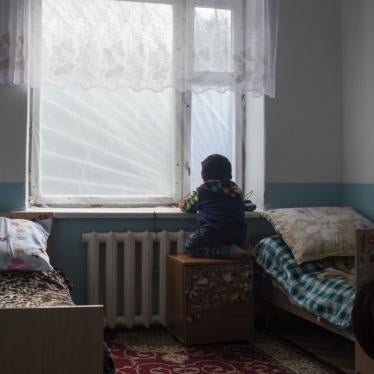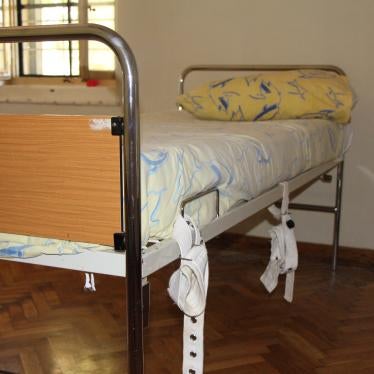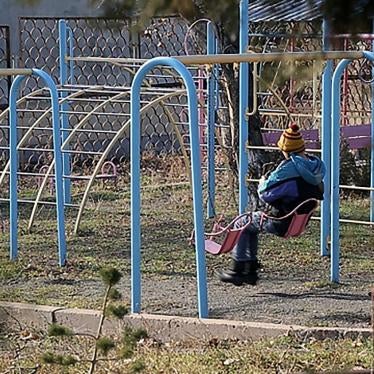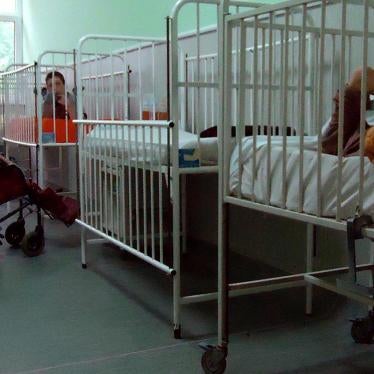Human Rights Watch welcomes the opportunity to provide input to the Committee on the Rights of Persons with Disabilities’ (“the Committee”) regarding the Draft Guidelines on Deinstitutionalization, including in emergencies. Human Rights Watch strongly supports the Committee’s interest in further examining article 19 of the Convention on the Rights of Persons with Disabilities (CRPD) on the right of persons with disabilities to live independently and be included in the community, and in providing concrete guidelines on its implementation.
This submission is based on Human Rights Watch’s research on Armenia, Brazil, India, Indonesia, Kazakhstan, Kyrgyzstan, Russia, Serbia, among other countries, as well as our ongoing monitoring of the right to live independently for persons with disabilities.
This submission focuses in particular on the need to promote and strengthen alternative care programs for children with disabilities; day care centers and respite care; transition from institutions to the community and deinstitutionalization plans; and on the need to end shackling of people with disabilities.
The Need to Promote and Strengthen Alternative Care programs for Children with Disabilities
In Armenia, Brazil, Croatia, Russia and Serbia, Human Rights Watch found that children with disabilities have been separated from their families and placed in institutions—due to poverty, pressure by medical professionals on parents to give up their child with a disability, abandonment, neglect, lack of local support services, or other reasons—and that alternative care programs in family-based settings for these children are unavailable.[1] In Croatia, Brazil, Serbia, Russia, and India, we found that separation from families leads to the placement of children with disabilities in institutions for prolonged periods of time, even for life.
Conditions in these institutions can be dire. Human Rights Watch documented in several countries, e.g. Russia, that children with disabilities often face serious neglect and abuse inside institutions, including beatings and psychological violence, involuntary and inappropriate medical treatment, use of abusive physical restraints, seclusion, and sedation. These abuses can severely impede children’s physical, intellectual, emotional, and social development.
Some governments, including in Brazil, Russia, Armenia, and Serbia, justify placement of children with disabilities with high support needs in institutions in the name of “care and treatment,” and fail to include this population in efforts to place children in alternative care programs or adoption. This should be considered a form of disability-based discrimination.[2]
Human Rights Watch research has found that deinstitutionalization efforts in Serbia left behind children who were deemed to be “severely disabled,” as government officials claimed their needs cannot be met in community settings. In Armenia, while the government had plans to close or transform three orphanages for children without disabilities, it had no plans to close or transform orphanages for children with disabilities. Keeping children with disabilities, including those with high support needs, in institutions instead of a family-based environment is discriminatory against children with disabilities. This practice could also lead to significant numbers of children with disabilities spending the rest of their lives in institutions.
The Committee's draft guidelines call on states parties to “ensure the right to family life for all children with disabilities” (para. 43) and stress that “family-based placements, with financial and other forms of support, should be created for all children with disabilities” (para. 46). In light of our research findings, we recommend that the Committee also includes detailed recommendations calling on states to promote alternative care programs in family-based settings and to make them accessible for all children with disabilities. Governments should ensure that systems promoting and implementing foster care and adoption take specific measures to ensure all children with disabilities are placed in foster and adoptive families on an equal basis with children without disabilities. States should pay particular attention to ensuring children with high support needs are included in alternative care programs such as foster care or adoption. Governments should also conduct outreach and awareness raising campaigns to facilitate inclusion of all children with disabilities in foster care and adoptive families, and offer support and training to foster families of children with disabilities. No matter their level of support needs, every child has the right not to be deprived of a life in a family setting.
Day Care Centers and Respite Care
In para. 26 of the draft guidelines, the Committee states that institutions providing respite care and day care centers cannot be considered community-based services. In para. 75, the Committee adds that the use of day-care centers is “paternalistic” and not in compliance with the CRPD.
Human Rights Watch research in countries including Brazil and Canada showed that respite services can offer important support for people with disabilities, including children, and an alternative to institutionalization and coercive psychiatry, especially during a period of transition from institutions to community-based living arrangements. In Canada, Human Rights Watch documented the work of the Gerstein Crisis Center, which offers a range of services and supports for people with psychosocial disabilities provided on a voluntary basis, including beds that are available for short stays for people in acute emotional distress and mental health crises.[3]
Human Rights Watch research in Serbia showed that the absence of day care facilities and inclusive schools contributed to parents feeling they had no choice but to send their child to an institution.[4] Ana, a single mother of a 12-year-old girl with physical and intellectual disabilities told us that the existence of community-based respite services where her daughter could spend some of her time would allow her as a single and full-time employed mother to raise her daughter at home.[5] Ana also told Human Rights Watch about her struggle to find a day care center where her daughter could spend time while she works: “Not one single day care center wanted to accept her. They explained they found her too hyperactive. I spent a year and half begging for an alternative where my daughter could spend her time while I was at work and I did not succeed. Three years ago, with no other option available, I placed her in an institution.”[6]
Our research in Serbia found that in some cases the development of day care centers was a positive step in providing support and accommodation during the working hours of parents, and as a support service to schools.[7] Such day centers were established with the primary purpose of facilitating the inclusion of children with disabilities who already lived with their families in kindergartens or schools and to facilitate family reunification for children who lived in the institution. Day care centers, however, should not become a substitute for enrollment in school, further segregating and isolating children with disabilities.
In Brazil, Human Rights Watch documented cases in which foster or adoptive families returned children to institutions citing the lack of sufficient services to support them in raising the child. Our research showed that services that children with disabilities and their families needed included inclusive education in neighborhood schools, accessible day care centers, accessible transportation, medical care and relevant therapies as well as financial support to help families meet the specific needs of the child with a disability.[8]
Based on our research findings that show the significant benefits that these types of services can provide, Human Rights Watch asks the Committee to clarify the definition of day care centers and respite services in the draft guidelines. We invite the Committee to consider including day care centers and respite services among recommended community-based services that can promote independent living for persons with disabilities, especially during the period of transition from institution to the community and as long as other alternatives are also provided.
We also ask the Committee to recommend that governments address the needs of adults and children with disabilities and their families in order to prevent institutionalization, including by making day care centers and respite care accessible, voluntary, and affordable, and as long as other independent living alternatives are also developed.
The Committee should clarify that no person can be placed in day care centers or respite services without a real choice and consent which implies the existence of a robust system for independent living. Also, day care and respite services offered as an option should be done as part of a comprehensive plan to ensure that community services, such as personal assistance, are available for persons with disabilities. Governments should also ensure that staff in residential service programs are trained on the standards and spirit of the CRPD.
Transition from Institutions to Community and Deinstitutionalization Plan
Recognizing that closing all institutions and transitioning fully to independent living solutions and community-based services will require time, we invite the Committee to consider adding a section with specific guidelines to ensure that the rights of persons with disabilities are respected in the transition period. This includes ensuring that the rights of adults and children who remain in institutions pending full deinstitutionalization and who are preparing for deinstitutionalization, as described in para. 90, are respected.
We invite the Committee to call on governments to prevent and remedy abuses against adults and children with disabilities in institutions during the deinstitutionalization transition period, by systematically monitoring institutions including for concerns such as restraints used as punishment, control, retaliation, or as a measure of convenience for staff, medication without consent and without clear medical purpose, and neglect.
We also ask the Committee to recommend that governments end the use of physical restraints and psychiatric drugs as means of controlling or disciplining persons with disabilities or for the convenience of staff and instead train staff in alternative methods and skills to de-escalate behavior. Governments should also examine ways to guarantee the privacy of people in institutions, especially for older children and adults, and take steps to ensure that all children in institutions participate in inclusive education in mainstream schools.
During the transition period, pending full deinstitutionalization, governments should ensure services are provided on a regular basis to children and adults with disabilities, including nutrition, health, education, leisure activities, and training to prepare residents for independent life. Until targeted, inclusive, community services are developed, in the short-term, governments should make resources that are concentrated in institutions, such as rehabilitation services, medical services, therapies, medical and other specialists, and other services, available to children and adults with disabilities living in nearby communities and their families, so that they may also benefit from such services.
Governments should also ensure accessible mechanisms for children and adults with disabilities in state institutions to report abuse without risk of retaliation. This includes informing people, including children, in an accessible manner about their rights and existing complaints mechanisms if violations occur. Governments should ensure individually tailored adjustments and accommodations to individuals to access complaint mechanisms and review processes, in line with article 13 of the CRPD.
We encourage the Committee to add a section to the guidelines with the specific steps that need to be taken to achieve full deinstitutionalization, including by creating time-bound comprehensive national plans that involve all stakeholders including close participation of organizations of people with disabilities and different service providers for independent living. The plans should be closely monitored by national human rights institutions or the national mechanisms for monitoring disability rights implementation.
Shackling of People with Psychosocial Disabilities
Human Rights Watch has documented that hundreds of thousands of men, women, and children (some as young as 10) with psychosocial disabilities have been shackled—chained or locked in confined spaces—at least once in their life across 60 countries around the world.[9] Shackling is often used in prayer camps, traditional or religious healing centers, as well as in state-run or private social care institutions as a form of restraint, punishment, or “treatment.”[10] Human Rights Watch has also found evidence of shackling or chaining in psychiatric hospitals in some countries.[11] The UN Special Rapporteur on torture has noted that shackling “unequivocally amount(s) to torture even if committed by non-State actors under conditions in which the State knows or ought to know about them.”[12]
Given that shackling is among the most egregious, archaic, and rudimentary form of physical restraints, we invite the Committee to add a recommendation to governments to end this inhuman practice and a reference to places where it is practiced, including prayer camps, which are already mentioned in para. 14.
[1] Human Rights Watch, “Once You Enter, You Never Leave”: Deinstitutionalization of Persons with Intellectual or Mental Disabilities in Croatia, September 23, 2010, https://www.hrw.org/report/2010/09/23/once-you-enter-you-never-leave/deinstitutionalization-persons-intellectual-or; Human Rights Watch, Abandoned by the State: Violence, Neglect, and Isolation for Children with Disabilities in Russian Orphanages, September 15, 2014, https://www.hrw.org/report/2014/09/15/abandoned-state/violence-neglect-and-isolation-children-disabilities-russian; Human Rights Watch, “It Is My Dream to Leave This Place”: Children with Disabilities in Serbian Institutions, June 8, 2016, https://www.hrw.org/report/2016/06/08/it-my-dream-leave-place/children-disabilities-serbian-institutions; Human Rights Watch, “When Will I Get to Go Home?”: Abuses and Discrimination against
Children in Institutions and Lack of Access to Quality Inclusive Education in Armenia, February 22, 2017, https://www.hrw.org/report/2017/02/22/when-will-i-get-go-home/abuses-and-discrimination-against-children-institutions.
[2] Human Rights Watch Letter to Senator Lidice da Mata, “Brazil: Reject Bill Undermining the Rights of People with Disability, Establish Special Multi-stakeholder Legislative Commission”; Human Rights Watch, Abandoned by the State; Human Rights Watch, “It is My Dream to Leave This Place.”
[3] Human Rights Watch, Canada Program Leads the Way in Addressing Mental Health Crises: Supportive Community Response, Rather than Law Enforcement, December 2, 2021, https://www.hrw.org/news/2021/12/02/canada-program-leads-way-addressing-mental-health-crises.
[4] Human Rights Watch, “It is My Dream to Leave This Place”, https://www.hrw.org/sites/default/files/report_pdf/serbia0616web_0.pdf, p. 38.
[5] Human Rights Watch Interview with Ana (pseudonym), Serbia, November 28, 2015. Serbia report pp. 38-39.
[6] Ibid.
[7] Human Rights Watch, “It is My Dream to Leave This Place”, pp. 42-43.
[8] Human Rights Watch, “They Stay Until They Die”: A Lifetime of Isolation and Neglect in Institutions for People with Disabilities in Brazil, May 23, 2018, https://www.hrw.org/sites/default/files/report_pdf/brazil0518_web2.pdf, p. 56.
[9] Human Rights Watch, Living in Chains: Shackling of People with Psychosocial Disabilities Worldwide, October 6, 2020, https://www.hrw.org/sites/default/files/media_2020/10/global_shackling1020_web_1.pdf.
[10] Ibid., p. 37. UNHRC, Report of the Special Rapporteur on the rights of persons with disabilities, Catalina Devandas-Aguilar, A/HRC/40/54, January 11, 2019, https://undocs.org/en/A/HRC/40/54 (accessed July 4, 2022).
[11] Ibid., p. 38.
[12] UNHRC, Follow up report of the Special Rapporteur on torture and other cruel, inhuman or degrading treatment or punishment on his follow-up visit to the Republic of Ghana, Session 31, A/HRC/31/57/Add.2, February 25, 2015, https://undocs.org/en/A/HRC/31/57/Add.2, para. 72.








